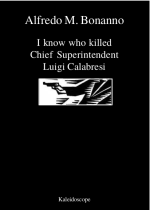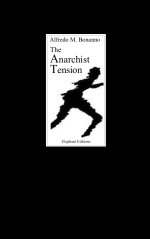Latest entries
Juan José Garfia
ADIÓS PRISIÓN
The story of the most spectacular escapes
This book talks about freedom, the urgent need for freedom and the impossibility of living without it. This book says that freedom must be taken back at all costs and that is exactly what the protagonists of Adiós Prisión, Spanish prisoners under the infamous FIES regime, did: they took back their freedom using all means necessary, challenging the impossible, ready to kill for it if necessary. There is no room for political correctness or abstract morals concerning human life here: if the screws keep you locked up and your life, even in its most banal and insignificant aspects, is at the mercy of their caprice, violence and stupidity, your only choice is to eliminate them if they put themselves between you and your freedom.
Feb 18, 2017 Read the whole text...
Alfredo M. Bonanno
I know who killed Chief Superintendent Luigi Calabresi
on May 17 1972, outside his house in via Cherubini 6, in Milan, at a quarter past nine in the morning
Basically, if we stop and think for a moment, what is there that we can be certain of? We get up in the morning, have a quick breakfast, rush to school, work, the nearest park to meet some friends, in a word, each towards their own daily business. In the evening we come back and lie between the sheets, nearly always the same as the evening before, where we can feel sure about the various events we have seen pass in front of our eyes during the whole day. As soon as some event takes place, no matter how simple, the coffee we had in the morning in the bar, everything surrounding it becomes confused, tends to suffocate in detail, and disappears in a non-requited desire for precision.
Feb 17, 2017 Read the whole text...
Alfredo M. Bonanno
Anarchists and action
Anarchists are not slaves to number but continue to act against power even when the class clash is at a low level in the mass. Anarchist action should not therefore aim at organising and defending the whole of the class of the exploited in one vast organisation to see the struggle from beginning to end, but should identify single aspects of the struggle and carry them through to their conclusion of attack.
Feb 16, 2017 Read the whole text...
Alfredo M. Bonanno
The Anarchist Tension
What is anarchism? It might seem strange that I should take up such a problem in this situation as I know for certain that there are many anarchists here, because I know them personally. And if nothing else, anarchists should at least know what anarchism is.
Feb 16, 2017 Read the whole text...
Alfredo M. Bonanno
And we will always be ready to storm the heavens again
(Against amnesty)
The Italian State had taken care to manage the vacuum left by the broken revolutionary movement long before revolutionaries started thinking about it. So anyone who starts shouting that any means are valid in order to free comrades from prison, should not complain afterwards that they find themselves standing alongside docile creatures who are no more than tools in the hands of power.
Feb 16, 2017 Read the whole text...
Alfredo M. Bonanno
Apart from the Obvious Exceptions
The appeal trial in Rome in which anarchists were accused of belonging to a clandestine armed organisation has concluded with higher sentences than those meted out on the previous occasion. That was in the logic of things. In my case I was sentenced to six years, i.e. an increase of two and a half years for a robbery in Rome which, needless to say, I know nothing about. If on the one hand the fact that there was no sentence for ‘armed organisation’ or ‘terrorism’ — to use the terms of the law — can be considered a defeat for the dogged zeal of general prosecutor Marini, the above-mentioned personage has every reason to feel pleased concerning the diatribes that this trial has led to within the anarchist movement.
Feb 16, 2017 Read the whole text...
Peter Kropotkin
The Conquest of Bread
Although The Conquest of Bread is undoubtedly one of the fundamental classics of anarchism, its present day validity is not as certain as it is linked to a precise situation of class struggle which cannot be easily clarified by referring to the analyses contained in the present volume. Put it aside? Consign it to the pleasing research of the historiographers, ever capable of giving a semblance of life to what has long been dead? Make a great task of separating the wheat from the chaff, patiently pointing out the parts that are still valid and those that are decidedly out of date? And, in such a case, what would remain of the unity of the work which, although accidental as it consists of pieces written at different times, cannot fail to leap to the eyes of even the most casual reader?
Feb 16, 2017 Read the whole text...
Alfredo M. Bonanno
A few notes on the revolutionary movement in Italy
A few considerations on the revolutionary movement in Italy from 1968 to the end of the eighties
The point of view of the anarchist movement in Italy in its various articulations is always for direct action, the refusal of the delegate and the negation of any kind of power whatsoever.
Feb 16, 2017 Read the whole text...
Alfredo M. Bonanno
Revolution, Violence, Anti-authoritarianism
A few notes
The rationalisation of exploitation at global level and the illumination among all those with a glimmer of dignity and passion that reformism is not the way to fight it, is leading to explosions of rebellion in many parts of the world. Anarchists are close to these moments, at least in spirit, but do we have anything to give this reality beyond causing immediate damage or attacking police lines? Must we continue to leave everything to chance, believing that organisational clarity will spring forth out of the blue? If we do, the great potential for new qualitative relations risks becoming reabsorbed into extremely pragmatic and convincing reformist programmes which apparently appear from nowhere. Some are not sleeping. The organisers of tomorrow’s misery lie constantly in wait for such opportunities to ride the tiger in order to harness and redomesticate it, possibly under slogans of freedom and self-management.
Feb 16, 2017 Read the whole text...
Alfredo M. Bonanno
The struggle for self-managed social space
From the first ‘enclosures’ of great masses of people into circumscribed spaces to the most advanced factories today, capitalism has tried to cut out portions of space to dedicate them to one specific use: the production of surplus value. Now, with the advent of the recent post-industrial development and advances in the technological process, the management of this space has changed profoundly. It has passed from partial management to a total one. In this capital has had the support of power and the State. We think that it is important to reflect on the conditions of the relationship that exists today between social space and capital.
Feb 16, 2017 Read the whole text...
Series
Fragments
Work in Progress
Anarchist Pocketbooks
Kaleidoscope
Anarchist Pamphlets
Bratach Dubh
Detritus
Drafts
Déjà vu
Insurrection (PDF)
Contact
e-mail: elephanteditions [at] riseup.net
Distributions
In Europe, Elephant Editions are distributed by Active Distribution
In the United States, Elephant editions are distributed by AK Press
In Italy, Elephant Editions are distributed by Edizioni Anarchismo
Other distributions please get in touch.








